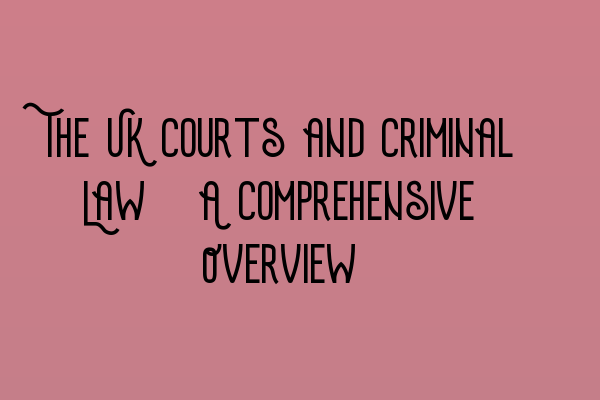The UK Courts and Criminal Law: A Comprehensive Overview
When it comes to navigating the intricate world of criminal law in the United Kingdom, understanding the structure and functions of the various courts is essential. From arrest to trial, each stage of the criminal justice system plays a crucial role in upholding the rule of law and ensuring justice is served. In this comprehensive overview, we will delve into the different courts in the UK and their key functions, providing aspiring solicitors with the essential knowledge they need to navigate this challenging field.
The Magistrates’ Court
The Magistrates’ Court is the first point of contact for most criminal cases in the UK. It handles a wide range of offenses, including minor crimes and summary offenses. The court consists of a panel of magistrates or a district judge who presides over the proceedings. These cases are usually dealt with swiftly and efficiently, aiming to ensure justice is served promptly. Those facing trial at the Magistrates’ Court have the option to choose whether they want their case tried by a judge or a jury.
The Crown Court
The Crown Court is the next tier of the criminal justice system in the UK and handles more serious criminal cases. Offenses such as robbery, murder, and sexual offenses are typically tried at the Crown Court. Unlike the Magistrates’ Court, all cases in the Crown Court are heard by a judge and a jury. The judge is responsible for guiding the jury through the legal process and ensuring a fair trial. It’s important to note that the Crown Court has the power to impose more severe penalties compared to the Magistrates’ Court.
The High Court
While the High Court predominantly deals with civil matters, it also has jurisdiction over certain criminal cases. The High Court typically hears cases that involve complex legal issues or cases that require a higher level of legal expertise. Appeals from the Magistrates’ Court and the Crown Court may be reviewed by the High Court to consider questions of law. It is an important avenue for seeking redress and ensuring proper legal analysis in criminal cases.
The Court of Appeal
The Court of Appeal is the highest court in the UK where appeals from the Crown Court and the High Court are heard. This court is divided into two divisions: the Civil Division and the Criminal Division. The Criminal Division handles appeals against convictions and sentences passed by the lower courts. It serves as a safeguard against any errors or miscarriages of justice that may have occurred during the trial process.
The Supreme Court
The Supreme Court is the final court of appeal in the UK, handling cases of constitutional importance and legal significance. While it primarily deals with civil cases, it also considers criminal appeals in instances where there are points of law of general public importance to be determined. The Supreme Court is the ultimate authority in the UK legal system and its decisions have a significant impact on the development and interpretation of the law.
Aspiring solicitors who aim to specialize in criminal law must familiarize themselves with the structure and functions of the UK courts. Understanding the roles and responsibilities of each court is crucial for providing effective legal representation and advice to clients. By ensuring a fair trial process and upholding the principles of justice, solicitors can play a pivotal role in maintaining the integrity of the criminal justice system.
For more information on different aspects of the legal profession, check out our related articles:
- SQE Exam Prep: Essential Study Materials for Aspiring Solicitors
- Demystifying the Solicitors Qualifying Examination Format
- SQE Exam for International Lawyers: Challenges and Success Strategies
- LLC Formation Made Simple: Step-by-Step Guide for UK Entrepreneurs
- LLC Formation: A Step-by-Step Guide for UK Entrepreneurs
By immersing themselves in these resources, aspiring solicitors can enhance their knowledge and skills, paving the way for a successful career in criminal law.
